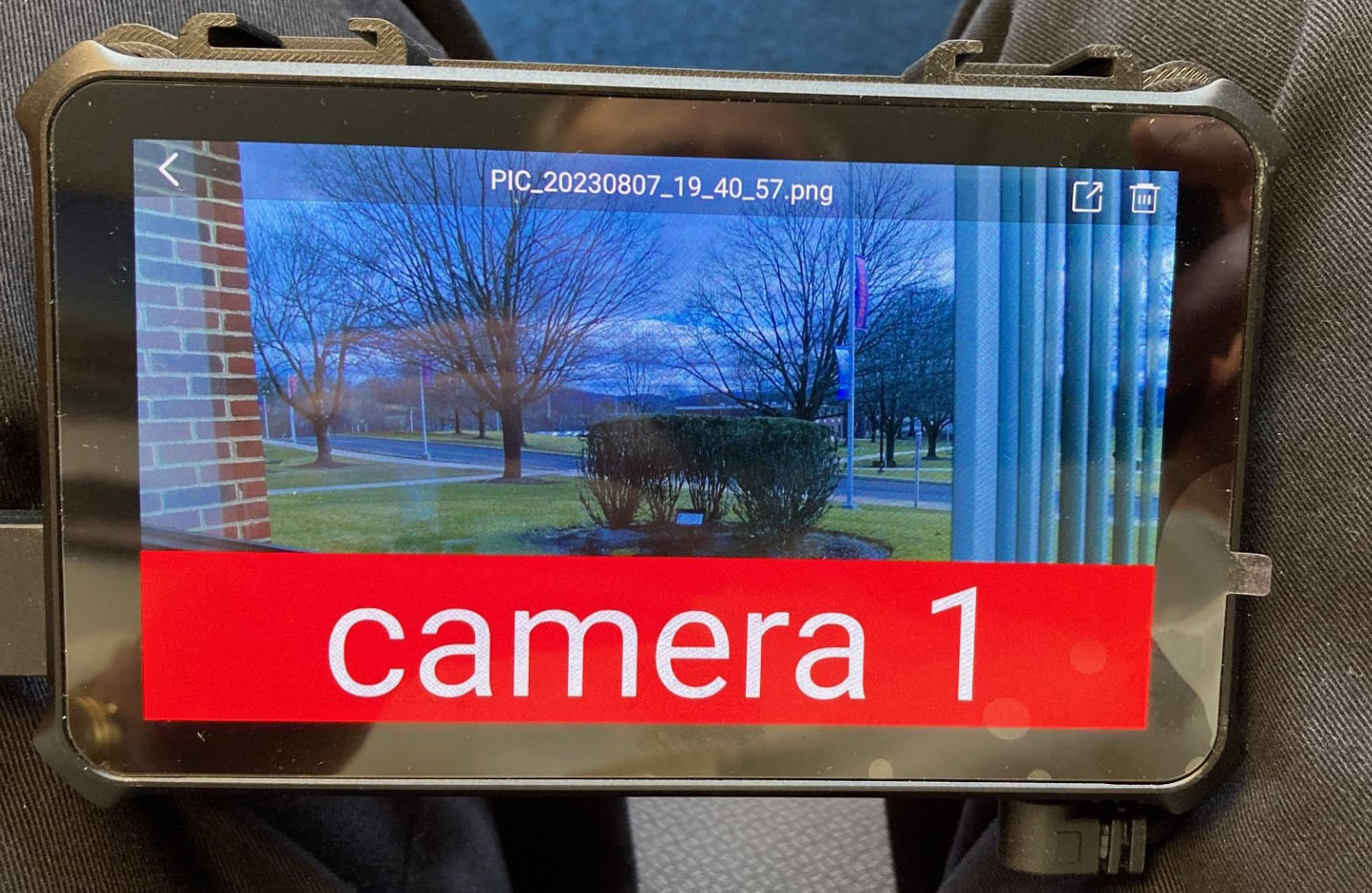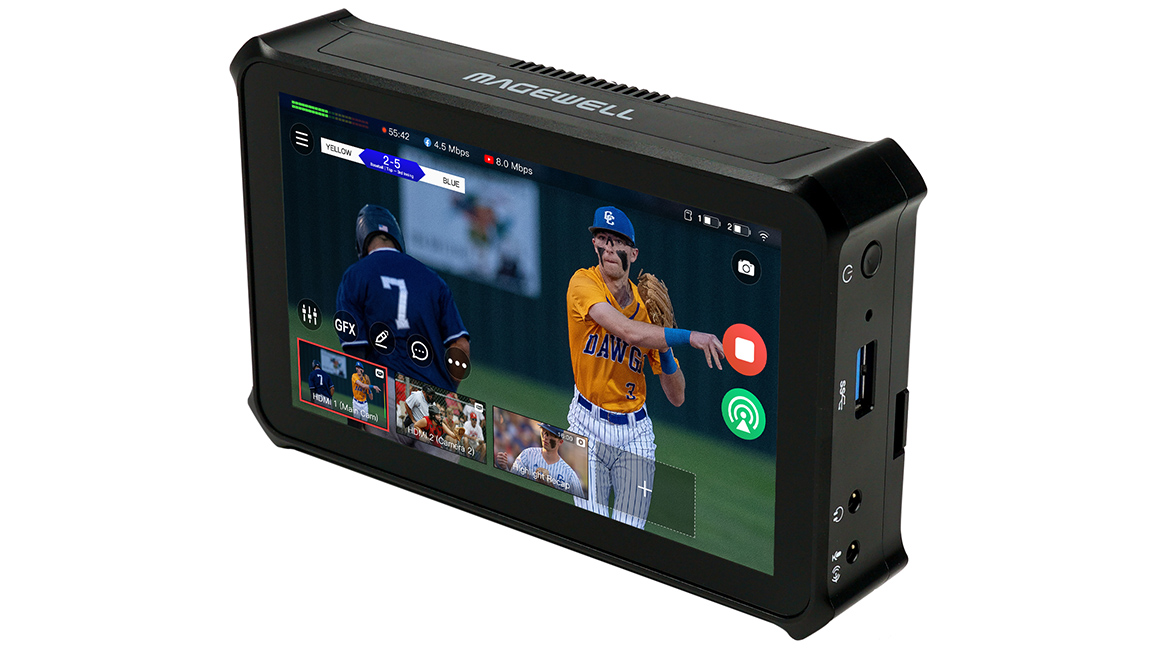At a time where remote crews are getting smaller and more responsibility is put on fewer people, there is no better time for technology to work in your favor. Magewell's Director Mini is a self-contained “mini” TV station. The all-in-one unit includes a switcher, CG with built-in scoreboard, DVR, monitor, and broadcasting system (streaming). But can a unit that's so small actually deliver big results?
I/O and Remote Assistance
Director Mini is roughly the size of a very chunky cell phone, so it fits in the palm of your hand, even if you have tiny hands. You probably don't want to hold the thing for the entirety of your shoot, so you can attach a tripod using an industry standard 1/4-20 thread. The unit can be powered using AC or optional NP-F batteries.
When I was working in live television, you were only as good as your video sources when creating a show. The output is important, but having numerous feeds is critical to have the most informative final product. Director Mini accepts numerous input sources through two USB AV and two HDMI inputs, plus up to three live IP streaming sources (RTMP, SRT, and NDI) as well as stored media.
[Product Review: Follow You, Follow Me]
Using the 5.44-inch OLED touchscreen horizontally for traditional video or vertically for cell phone images, you can cut or transition between live or stored video and audio. Speaking of phones, Magewell's free Director Utility app allows your phone to be a mobile camera as well as a remote “assistant” for system configuration, switching, audio control, and more.
Director Mini has more functionality than the $20,000 switcher in our control room.
In our university’s TV studio, we need to run long HDMI or fiber optic cables from the cameras to our control room-based video switcher. By using the Director Mini with a Magewell Ultra Encode Plus encoder, the HDMI sources can be encoded for network-based NDI HX3 transport. Other complementary Magewell solutions, such as Pro Convert decoders, enable multiple locations to utilize the Director Mini feeds.
Director Mini outputs up to 1080p/60fps at a 30 Mbps bit rate, but it can accept sources up to 4K and downconvert them automatically. It can stream to social media platforms like Facebook and YouTube Live or other locations via Ethernet or Wi-Fi. Need to store your show? Insert an SD card or just use the unit's internal 64 GB storage.
Facing the unit, the left side has two HDMI inputs with a USB 3.0 in between. The right side includes its own USB 3.0 port, plus the 3.5mm microphone/line input, 3.5mm headphone output, and power button. Positioned around the centrally located mounting screw on the bottom are the Ethernet port, SD card slot, USB-C out, and 12-volt AC input. Both optional batteries attach on the back and are separated by the cooling fan.
Multi-Camera Possibilities
My review Director Mini arrived with an AC power adapter with four wall receptacles for worldwide use, plus two mini stands, sunhood with two thumbscrews, and quick start guide. Third-party accessories such as a screen cover and desktop stand are also available.
At our university, video production equipment is used by all the students, which can drastically shorten the lifespan of said equipment. Although I only had the Director Mini for a few weeks, I believe it is built well and will hold up to multiple operators.
After connecting the unit to my home’s Wi-Fi, I downloaded the Director Utility app from the App Store. Within a few moments, I could control the Director Mini from my iPhone. Director Mini can be controlled by its own touchscreen, the app, or a web interface. On the touchscreen, touching the icon in the upper left corner brings up: Create a show, Show list, Album, Settings, Feedback, and Help. On the bottom left is a dotted rectangle with a plus in the center. That opens Create a New Scene with 10 options for sources.

When I returned to campus, I hooked up two Blackmagic 6K Pocket Cameras via the two HDMI inputs. Once powered on and the graphics display finished its starting routine, it was ready for its first assignment. Selecting each input showed the image on the touchscreen. However, when I tried to use my iPhone as a third camera input, our university’s firewall stopped it. Thankfully, Director Mini can also serve as a Wi-Fi access point, so phones can connect directly to the device. The test shoots I did from my office looked great, and I was able to label the cameras using the built-in CG system.
If I had the Director Mini for a longer period, I would have sent a remote crew out to one of our sporting events. The last sporting event we covered had tethered cameras with their HDMIs going into an amp and then to our switcher. Dealing with cables, AC feeds, etc. made the logistics a nightmare. Had I only known about the Director Mini then—capturing an away game with student shooters using their phones, everything could have streamed live from the event, and we could have saved the production directly to the unit.
[Review: Audio-Technica Targets Streaming Production with StreamSet]
Anywhere a remote production is required, you now have the necessary tool to tie everything together. Director Mini had more functionality than the $20,000 switcher in our control room. Setup time is drastically reduced; the numerous possible sources connect quickly, and the operation is very intuitive. Numerous inputs, full-sized switcher functionality, internal and external DVR capability, and export options abound. I'm not sure you can get this much control in anything costing twice as much or double the size.

